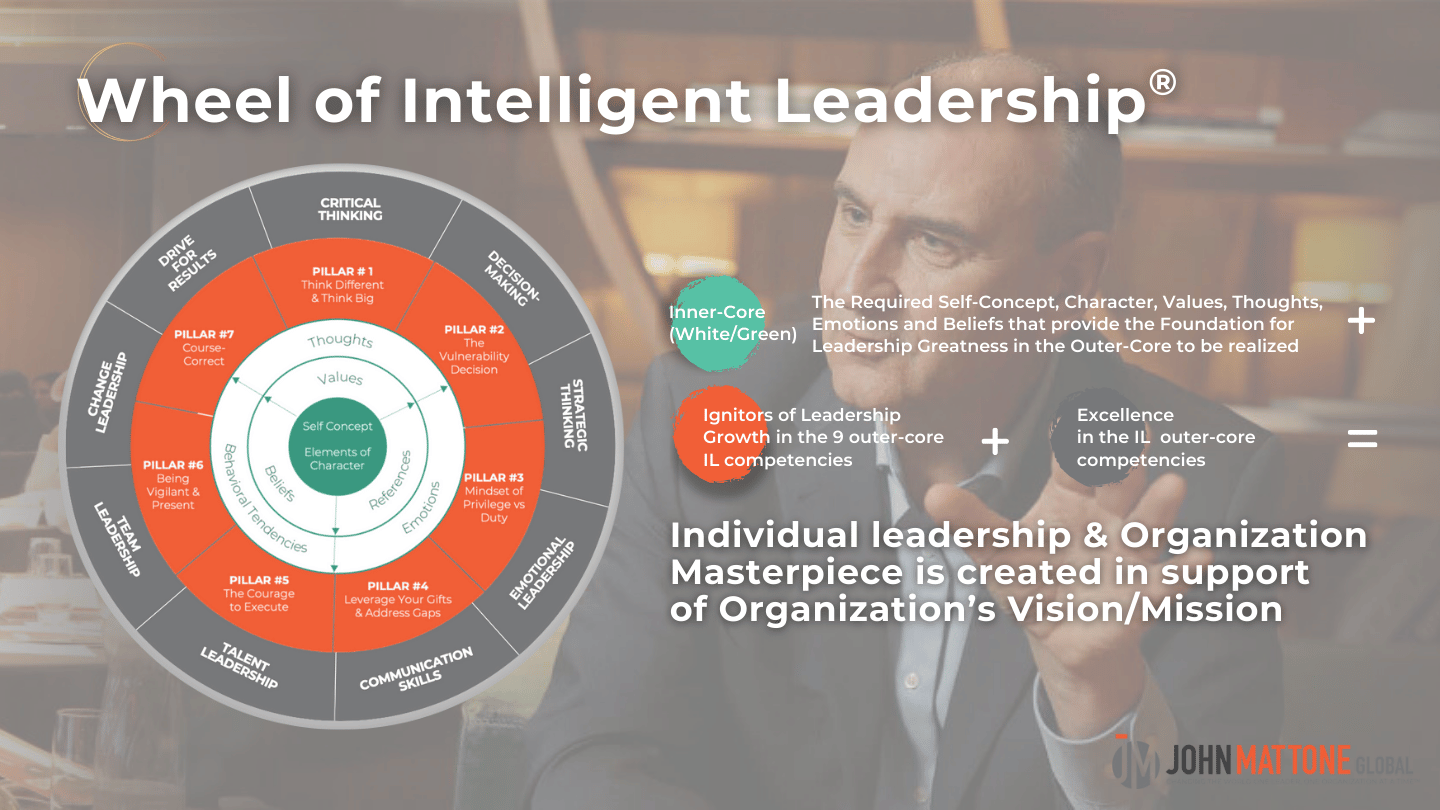THE WORLD’S #1 EXECUTIVE COACHING AND BUSINESS COACHING BLOG SINCE 2017.
Inner Core Leadership: The Center of Intelligent Leadership
Published On: March 26, 2025 | Last updated on: November 24, 2025 | Author: John Mattone | Category: Blog, Intelligent Leadership

An organization’s success is directly tied to the maturity and depth of its leadership. Growth is the natural byproduct of strong leadership, where leaders can drive long-term results, inspire teams, and make the tough decisions that move an organization forward. If a company isn’t growing, it’s deteriorating. If leaders aren’t embracing continuous learning and evolving, they become irrelevant.
Leadership is an inside-out process. Before you can influence, inspire, and execute effectively in your leadership position, you must first develop the foundational elements within yourself.
Without them, leaders suffer from inconsistency, poor decision-making, and an inability to handle adversity.
Strong leadership abilities don’t emerge by chance; they are cultivated through deep self-awareness, character refinement, and an unrelenting commitment to growth.
I’ve spent decades coaching executives, helping them unlock their full leadership potential. I’ve found that the best leaders who create lasting impact understand that their leadership skills are only as strong as the foundation on which they are built.
That foundation is their inner core, which determines everything—their ability to lead effectively, inspire confidence, and leave a powerful legacy.
The Leadership Qualities of a Capable Leader
Leaders must be adaptable, resilient, and deeply connected to their core values. Without that, no amount of strategy, technical skill, or experience will be enough to sustain long-term success. Leadership is not just about what you do—it’s about who you are at your core. And when you master that, everything else follows.
To treat setbacks as learning opportunities, leaders need maturity and healthy self-concepts. Your self-concept and character elements comprise the inner core of your leadership competencies and the source of your thoughts, emotions, and leadership behaviors.
Leaders deal with difficult people, situations, and challenges every day. Difficult situations carry the possibility of failure. Teaching leaders how to deal with failure is one of the priorities of leadership coaching.
Failures can accumulate, filling our virtual reservoir of leadership experiences with negativity. This reservoir is a fuel tank for the intelligent leader, and it is important to fill it with positive personal or vicarious experiences.

Your inner core defines your leadership.
Whenever we face challenges, we reach into our personal reservoirs of leadership references. If we meet negativity there, we fall victim to learned helplessness.
In my book “Intelligent Leadership,” I point out that leaders unaware of their psychological vulnerabilities cannot interpret failures or difficult situations and people with whom they regularly deal with Such an inability is an unsustainable leadership weakness.
The Dangers of Learned Helplessness
Building a reservoir of positively charged references is not easy. It requires intentionality. For a leader who is not aware of the existence of this reservoir, being intentional about building it is impossible.
Leaders learn to be helpless in certain situations without a reliable way to interpret and store negative experiences.
If you fail repeatedly at a task, your immature brain (lacking higher awareness) grows to think you can never succeed. It teaches you’re “supposed” to fail.
The tools that allow leaders to combat learned helplessness stem from deep awareness and an understanding of one’s own character, aka a strong self-concept.
This, coupled with the elements that make up one’s character, constitutes the innermost source of one’s leadership: one’s inner core.
The Intelligent Leadership Model: Why Inner Core Development Matters
Too often, leaders focus solely on external competencies like strategic thinking, communication or decision-making without strengthening the foundational leadership qualities supporting those skills.
But without a strong inner core, even the most skilled leader will struggle with consistency, resilience, and influence and lack a leadership style that can bring long-term success.
What Is Intelligent Leadership?
I developed the Intelligent Leadership model because there was a critical gap in leadership development. Too much focus was being placed on external behaviors—what leaders should do—without addressing the inner foundation that drives those behaviors. Intelligent Leadership bridges that gap by integrating both:
- Inner Core Development – Strengthening the values, beliefs, and self-concept that form a leader’s foundation.
- Outer Core Execution – Mastering leadership skills and competencies that shape a leader’s influence and execution.
When leaders focus only on external skills, they often lack the depth and authenticity that inspire trust. They also neglect their inner core, which causes them to struggle to lead consistently. The most self-aware leader develops both.

Like an iceberg, the majority of leadership lies beneath—in the inner core
Understanding Your Inner Core: The Source of Leadership Strength
A leader’s inner core is the foundation of everything they do. It consists of deeply ingrained values, beliefs, and self-concepts that drive every decision, action, and relationship. Without it, even the most technically skilled leader will struggle to maintain effective leadership over the long haul.
What Is the Inner Core?
Your inner core consists of the unseen but essential elements that define your leadership:
- Character – The moral and ethical foundation of leadership.
- Values – The guiding principles that shape decisions and priorities.
- Beliefs – The deeply held assumptions about yourself, others, and the world.
- Self-Concept – The way you see yourself and your leadership role.
Together, these elements form the foundation of your key leadership qualities. They determine how you show up in moments of pressure, inspire and engage your team, and navigate challenges with resilience. They shape a leader’s influence, resilience, and ability to connect to team members with authenticity and empathy.
1. Character: The Moral Compass of Leadership
Your character is the bedrock of your leadership. It determines how you handle adversity, how you interact with others, and whether people trust and respect you. Without a strong character, no amount of skill or experience can make you a truly effective leader.
At the core of leadership character are six fundamental virtues:
- Courage – The ability to take decisive action despite fear or uncertainty. Courage is the catalytic source of the other virtues. It allows courageous leaders to do good after identifying right and wrong. Without courage, there is no consistency, and inconsistent leaders cannot motivate or inspire others.
- Loyalty – The commitment to stand by your people and your principles. As I’ve stated in my business coaching posts, loyalty is every community’s basic sustaining framework and energy. Disloyalty erodes communities, hierarchical leadership structures, trust, and organizations.
- Diligence – The perseverance to stay focused and accountable. Executive coaching relies on a foundation that allows leaders to be steady performers while giving them platforms they can use to minimize setbacks. These platforms and foundations equal diligence. Coupled with accountability, diligence is the undeniable fuel of personal and organizational success.
- Modesty – The humility to recognize that leadership is about serving others, not feeding your ego. Modesty is the mature leader’s anchor to reality. Modest leaders keep their emotions grounded and their views of themselves and their organizations prudent. The perpetual counterbalance to arrogance and modesty boosts improved decision-making and outcomes.
- Honesty – The foundation of trust and credibility. Honesty is the foundation of trust. Mature leaders understand that dishonesty may present tempting shortcuts, but a genuine, aboveboard existence always trumps such short-term gains. A minor, honest profit is more valuable than a major one incurred through dishonesty.
- Gratitude – The ability to see every challenge as a learning opportunity and every person as valuable. Mature leaders are grateful for their experiences, positive and negative. Those who know how to relate to setbacks with maturity see them as nothing more than learning opportunities and deserving of gratitude. Grateful leaders find it easier to appreciate the efforts of others and offer genuine praise.
The six character elements exist in permanent interdependence, complementing and supporting one another.
A leader’s character isn’t revealed in moments of ease—it’s forged in moments of adversity. The question isn’t whether you will face difficult situations; it’s whether you will have the inner strength to navigate them with integrity.

2. Values: The Guiding Principles of Decision-Making
Every leader operates from a set of values, whether they realize it or not. The problem is that many leaders have not taken the time to define their values intentionally. As a result, they make inconsistent or reactive decisions that erode trust and effectiveness.
Good leaders are clear on their values and ensure their actions align with them. They don’t just talk about integrity, accountability, or service—they embody these principles in everything they do.
Ask yourself:
- What principles guide my decisions?
- Do my daily actions reflect my core values?
- Would my team members say that I lead by example?
If your values are unclear, your leadership will be inconsistent. Inconsistency is one of the fastest ways to lose credibility with your team.
3. Beliefs: The Assumptions that Shape Leadership
Your beliefs—about yourself, your team, and the world around you—determine how you lead. Influential leaders operate from empowering beliefs, while ineffective leaders allow limiting beliefs to hold them back.
Consider these two contrasting mindsets:
- Limiting belief: “I’m not good enough to lead at the next level.”
- Empowering belief: “I may not have all the answers, but I am committed to learning and growing.”
- Limiting belief: “My team members don’t care as much as I do.”
- Empowering belief: “If I inspire and empower my team, they will rise to the challenge.”
Leaders who hold onto limiting beliefs undermine their success before they begin. But when leaders shift their beliefs, they unlock their potential—and the potential of those around them.
4. Self-Concept: The Mirror of Leadership Effectiveness
Your self-concept is how you see yourself as a leader. It dictates how you appear in every interaction, respond to challenges, and influence those around you. Leaders with a strong, healthy self-concept project confidence, while those with a weak self-concept often struggle with indecision and insecurity.
Empathetic leaders who inspire and uplift others have mastered their self-concept. They understand their strengths, embrace their development areas, and refuse to let fear or doubt dictate their leadership.
To strengthen your self-concept, ask yourself:
- Do I see myself as a leader capable of making a meaningful impact?
- Am I confident in my abilities, or do I constantly seek external validation?
- Do I take ownership of my leadership journey or let circumstances define me?
A weak self-concept limits your ability to influence and inspire others. A strong self-concept, on the other hand, allows you to lead with conviction, resilience, and authenticity.
Conclusion: Your Inner Core Determines Your Leadership Legacy
Leadership isn’t about titles, authority, or expertise—it’s about who you are. The most influential leaders aren’t the ones who execute strategies or manage operations; they’re the ones who inspire, empower, and leave a lasting impact on the people and organizations they lead.
Everything we’ve explored—from character and values to courage and self-awareness—boils down to one truth: Your leadership begins within.
Leaders who neglect their inner core will struggle to lead with consistency, conviction, and authenticity. However, leaders who strengthen their inner foundation will stand firm in the face of challenges, elevate their team members, and drive sustained success.
If you’re ready to elevate your leadership, strengthen your inner core, and unlock your full potential, now is the time to take action. Schedule your free discovery session with John Mattone Global and start your journey toward deeper self-awareness, servant leadership, and courageous decision-making.


